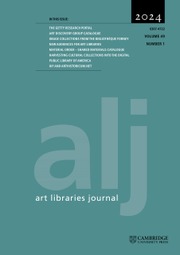Article contents
Reconnecting library architecture and the information space
Published online by Cambridge University Press: 06 June 2016
Abstract
This article explores how our understanding of the materiality of knowledge has changed during the 20th century and how these meanings got incorporated into the concept of information. Special attention is given to Paul Otlet, the founding father of documentation, and to Norbert Wiener, the founding father of cybernetics. Furthermore, there is the question of what these changes that surround the notion of information imply for the architectural conception of the library. If the current discourse treats the library no longer as a space of books but as an information space, what implications does this evolution have for the architecture of the contemporary library? What is this information space that architects are required to articulate and to interpret?
- Type
- Research Article
- Information
- Copyright
- Copyright © The Art Libraries Society 2010
References
- 2
- Cited by


